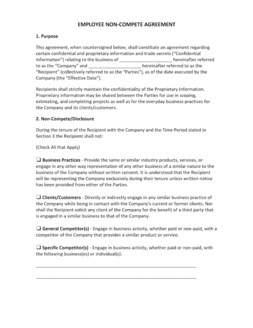- Eviction Notice Forms
- Power of Attorney Forms Forms
- Bill of Sale (Purchase Agreement) Forms
- Lease Agreement Forms
- Rental Application Forms
- Living Will Forms Forms
- Recommendation Letters Forms
- Resignation Letters Forms
- Release of Liability Agreement Forms
- Promissory Note Forms
- LLC Operating Agreement Forms
- Deed of Sale Forms
- Consent Form Forms
- Support Affidavit Forms
- Paternity Affidavit Forms
- Marital Affidavit Forms
- Financial Affidavit Forms
- Residential Affidavit Forms
- Affidavit of Identity Forms
- Affidavit of Title Forms
- Employment Affidavit Forms
- Affidavit of Loss Forms
- Gift Affidavit Forms
- Small Estate Affidavit Forms
- Service Affidavit Forms
- Heirship Affidavit Forms
- Survivorship Affidavit Forms
- Desistance Affidavit Forms
- Discrepancy Affidavit Forms
- Career Assessment - 16+ Examples, Format, Tips, Pdf Forms
- Undertaking Affidavit Forms
- General Affidavit Forms
- Affidavit of Death Forms
Employee Non-compete Agreement
The corporate world is a competitive field, made up of goal-driven people. And when a company loses one talent with great potential many things can go downhill—especially if one person is exposed to confidential information about the company’s business deals. That is why every employer should protect their business with an employee non-compete agreement. This agreement is standard in hiring new employees, and it could be used against them if they put up a company of the same nature in the future. Find out more about an employee non-compete agreement by reading through this article. Read More
Employee Non-compete Agreement
What Is an Employee Non-compete Agreement?
According to Workplacefairness.org, an employee non-compete agreement is a document binding an employer and employee. It blocks an employee from engaging with a business that competes with their current employer for a limited time. If the employer cannot make the other party sign the agreement, they can choose not to hire an applicant or terminate an existing employee. Unlike most contracts that are approved by the court, an employee non-compete agreement is not legally accepted unless it is reasonable. For an employee they can limit the power of the contract by considering what is necessary to protect the parties involved.
How Do You Craft an Employee Non-compete Agreement?
Creating an agreement is not easy. It has to be reasonable and should not weigh on someone’s shoulders. In short, agreements must not take advantage of the power to manipulate terms and conditions on top of every policy it entails. Thus, this document must protect both parties from any dispute that might occur in the future.
Sometimes, the success of creating legal documents relies on templates that are ready-made and editable. Legal papers are stenciled from a standard format; this means it is safer to use agreement templates rather than starting from scratch. Here are easy steps on how to make an employee non-compete agreement in PDF and MS Word file formats:
1. Learn the Laws that Govern Your Business
Often, an individual or company (acting as a contractor) acquires the employee non-compete agreement at the time of employment. The agreement’s author typically asks for a non-compete provision if they would like to limit the competition in the same industry within a particular location, and for a specific time. If you are an employer, you need to familiarize yourself with the laws on trade secrets in your area (e.g., state, country) because some requirements depend on the business’s location. Also, it helps the employee understand what they can or cannot prevent the employee from doing. The court can invalidate the agreement for the severability clause or illegal contracts.
2. Decide Who to Prohibit
The decision to implement an employee non-compete agreement lies in an employer’s hand. That why it is essential to be critical in deciding who to prohibit from working if someone quits or leaves the business. The power of the employer can go as far as barring someone from working for themselves or self-employment. Moreover, writing these prohibitions should be specific. The court may not acknowledge the ban on solely working on the internet. However, some websites and applications are restricted by the court. Violating the agreement is enough ground to pursue legal actions against the breacher.
3. Regulate Graphical Monitoring
Pushing beyond the trade-area in which the agreement is active can be excessive. Because of that, the employer can select the geographical area where the business can cover trade secrets. For example, banning an employee from working in places the company is non-existent. Additionally, the agreement must not include any soliciting clause. It is the act of recruiting clients or employees into the competitor’s business. Typically, the employment agreement restricts this, but a non-compete deal should not. This protects the company from losing trusted people.
4. Provide the Time-Frame and Have It Signed
Choosing the time-frame for the agreement can be tricky, especially since some states do not allow more than five years. Even the length is already imprudent. Thus, the court recommends at least one or two years. Furthermore, because of the agreement’s sensitive nature, signing it with the presence of a notary public and a witness who is not associated with either of the parties is encouraged. This signifies that the employee validated the document as required by the laws at the time of signing. Although anyone could legally get out of this agreement, it is essential to review a non-compete agreement before sealing the deal.
Frequently Asked Questions
How does one get out of an employee non-compete agreement?
There are various reasons why an employee non-compete agreement becomes questionable: (a) Unreasonable length of the time of the non-compete agreement; (b) unreasonable geographical requirements; (c) unreasonable professions identified; (d) causes undue hardships to fall onto the employee; (e) discriminatory nature; and (f) deceitful inducement. Any of these can challenge the employer into court.
What happens if I violate an employee non-compete agreement?
Violating the agreement is a ground for legal actions against the party who breached the contract. The court will intervene if any of the parties violated the non-compete agreement. They will decide whether to favor both party’s interests or not. The court can even implement the request compensation on the damages acquired by any of the parties involved. If an employer breaches the agreement, their employee would be relieved from the agreed obligations.
Is an employee non-compete agreement legally enforceable?
A non-compete agreement that is not too excessive in the time-frame and territory covered is more likely enforceable by law. However, some places or states do not allow a non-compete agreement between employers and employees. Hence, it is not legally binding in that area. On the other hand, some places will enable the use of this agreement to enforce employment terms. So, be familiar with the laws in your location before crafting or signing an employee non-compete agreement.
Because of the competition in many industries, hiring the best people can take a lot of time. A system has to sift through them to recruit the best people for the job. Afterward, companies will trust these people with trade secrets and highly confidential business information. However, trust can be broken even in the corporate world. So, craft an employee non-compete agreement in case someone quits or leaves the business. It will prevent employees from competing for their former or current employers. The agreement protects the employer’s ownership over data that should remain within the business’s knowledge.

